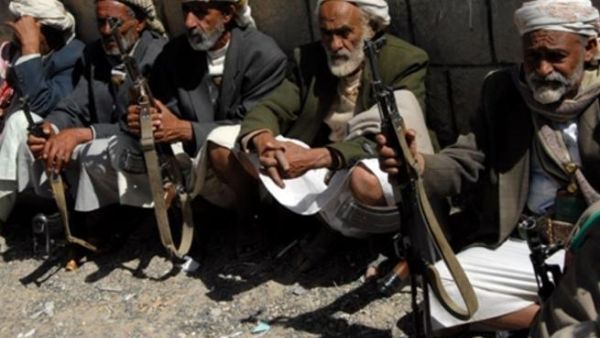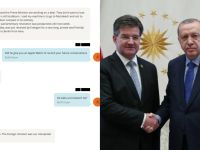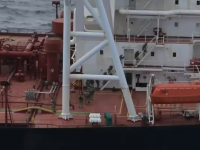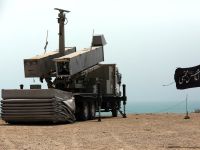President Ali Abdullah Saleh lied about American bombings in Yemen, revealed classified US embassy cables from around the world.
The secret documents were released on the WikiLeaks website earlier this week. It detailed a conversation between President Saleh, US General Patraeus and Yemen's Deputy Prime Minister Rashad Al-Alimi.
The leaked cable marked 'secret' summarized a 90-minute conversation between the US commander of Centcom and President Saleh on January 4 earlier this year.
The cable quotes the president saying, "we'll continue saying the bombs are ours, not yours." He referred to the bombings in Abyan governorate on December 17 and 24 last year which killed 14 women and 21 children.
The document continued: "Prompting Deputy Prime Minister Alimi to joke that he had just 'lied' by telling Parliament that the bombs in Arhab, Abyan, and Shebwa were American-made but deployed by the Republic of Yemen Government."
The leaked cable corroborates images, released earlier this year, showing that the US military carried out the missile strike on an alleged Al Qaeda training camp at Al-Majalah in Abyan on December 2009. Amnesty International confirmed that this missile strike killed 41 local residents.
"The cable appears to confirm Amnesty International's finding that the Abyan strike was carried out by the US military, not Yemeni government forces," said Philip Luther, Amnesty International's Deputy Director for the Middle East and North Africa, in a statement yesterday.
The human rights lobby group said it had yet to receive a response for a request for information, put to the Pentagon in June, about the involvement of US forces in the Al-Majalah attack. A press report a day after the images were released stated that the US declined to comment on the strike.
The Yemen government has so far failed to respond to the leaked information. Mohammed Al-Qaedi, spokesman for the interior ministry, refused to comment when the Yemen Times contacted him. This newspaper attempted multiple times to contact deputy and senior ministers at the interior ministry and the ministry of foreign affairs, but was unable to get a response.
MP Mansour Aziz Al-Zindani for the Islah opposition party pressed the government to respond.
"It is the responsibility of Yemen's ministry of foreign affairs to provide an explanation to the Yemeni people regarding the Wikileaks revelations... The silence by the government raises doubts," he said.
"In Yemen there is only silence. If it is proved the deputy minister for security and defense affairs, Rashad Al-Alimi, who was mentioned in the WikiLeaks document lied, he should apologize to parliament and resign."
Similarly, the US embassy in Sana'a did not wish to comment when the Yemen Times contacted it and instead referred to the official response released in Washington on Monday.
In the cable, released in the first batch of 251,287 documents to be disclosed by the WikiLeaks site over the next seven days, President Saleh joked about whiskey smuggled into Yemen.
"Tell (Djiboutian President) Ismail Guelleh that I don't care if he smuggles whiskey into Yemen – provided it's good whiskey – but not drugs or weapons," the document quotes the president.
The cable detailing the confidential conversation between the US military commander and Yemen's leader is just one recorded conversation in the largest set of confidential documents ever to be released into the public domain. The non-profit media organization, WikiLeaks, was launched in 2006 and is led by former computer hacker Julian Assange from Australia. The publisher, which specializes in releasing anonymous sourced data, has previously been responsible for leaking thousands of documents involving US military actions in both the wars in Afghanistan and Iraq.
The WikiLeaks website began publishing this current leak of US embassy cables last Sunday, giving people around the world an insight into US foreign activity from 1966 to February this year.
The cables contain confidential communications between 274 embassies in countries throughout the world and the State Department in Washington DC. At least 15,652 of the cables are classified 'Secret'. It's believed that Bradley Manning, 22-year-old US intelligence analyst, leaked the data to the website. Manning was arrested and charged with the unauthorized use and disclosure of U.S. classified information in May.
The first 'data dump' on Sunday by WikiLeaks involved mainly Middle Eastern countries. Other information revealed in the cables indicated the threat of Iran felt by leaders across the region.
King Abdullah of Saudi Arabia pressed the US to attack Iran. In February last year, the UAE asked the US for five Patriot missile batteries to shoot down incoming Iranian missiles because of an "increasingly likely pre-emptive Israeli attack" on Iran's nuclear facilities.
According to the leaked documents the UAE believes Yemen's Houthi rebel movement is supported by Iran and Syrian authorities continue to give weapons to Hezbollah in Lebanon.
Iran's President Ahmadinejad sought to dismiss the leaked diplomatic cables. In a live TV press briefing, he called them US "mischief" aimed to destabilise an already volatile region.
The Yemen Times understands further Yemen-related cables would be released by the WikiLeaks site this week, possibly on Saturday








